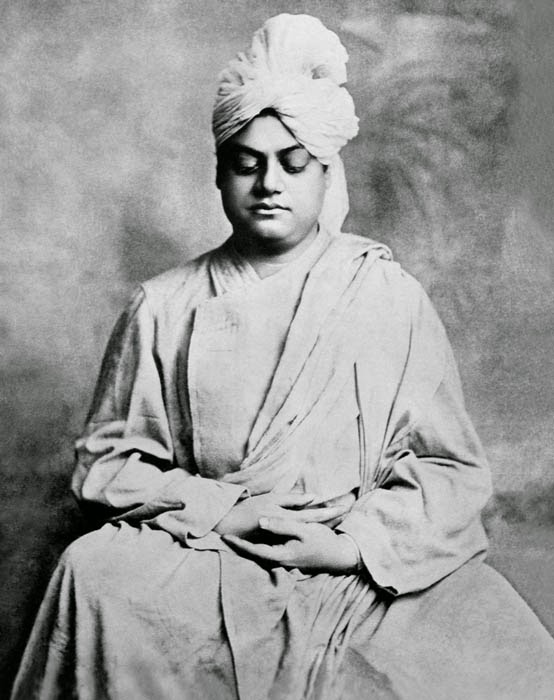STEPS OF HINDU PHILOSOPHIC THOUGHT : 3.
The first group of religious ideas that we see coming up — I mean recognised religious ideas, and not the very low ideas, which do not deserve the name of religion — all include the idea of inspiration and revealed books and so forth. The first group of religious ideas starts with the idea of God. Here is the universe, and this universe is created by a certain Being. Everything that is in this universe has been created by Him. Along with that, at a later stage, comes the idea of soul — that there is this body, and something inside this body which is not the body. This is the most primitive idea of religion that we know. We can find a few followers of that in India, but it was given up very early. The Indian religions take a peculiar start. It is only by strict analysis, and much calculation and conjecture, that we can ever think that that stage existed in Indian religions. The tangible state in which we find them is the next step, not the first one.
At the earliest step the idea of creation is very peculiar, and it is that the whole universe is created out of zero, at the will of God; that all this universe did not exist, and out of this nothingness all this has come. In the next stage we find this conclusion is questioned. How can existence be produced out of nonexistence? At the first step in the Vedanta this question is asked. If this universe is existent it must have come out of something, because it was very easy to see that nothing comes out of nothing, anywhere. All work that is done by human hands requires materials. If a house is built, the material was existing before; if a boat is made the material existed before; if any implements are made, the materials were existing before. So the effect is produced. Naturally, therefore, the first idea that this world was created out of nothing was rejected, and some material out of which this world was created was wanted. The whole history of religion, in fact, is this search after that material.
Out of what has all this been produced? Apart from the question of the efficient cause, or God, apart from the question that God created the universe, the great question of all questions is: Out of what did He create it? All the philosophies are turning, as it were, on this question. One solution is that nature, God, and soul are eternal existences, as if three lines are running parallel eternally, of which nature and soul comprise what they call the dependent, and God the independent Reality. Every soul, like every particle of matter, is perfectly dependent on the will of God. Before going to the other steps we will take up the idea of soul, and then find that with all the Vedantic philosophers, there is one tremendous departure from all Western philosophy. All of them have a common psychology.
Whatever their philosophy may have been, their psychology is the same in India, the old Sânkhya psychology. According to this, perception occurs by the transmission of the vibrations which first come to the external sense-organs, from the external to the internal organs, from the internal organs to the mind, from the mind to the Buddhi, from the Buddhi or intellect, to something which is a unit, which they call the Âtman. Coming to modern physiology, we know that it has found centres for all the different sensations. First it finds the lower centres, and then a higher grade of centres, and these two centres exactly correspond with the internal organs and the mind, but not one centre has been found which controls all the other centres.
So physiology cannot tell what unifies all these centres. Where do the centres get united? The centres in the brain are all different. and there is not one centre which controls all the other centres; therefore, so far as it goes, the Indian psychology stands unchallenged upon this point. We must have this unification, some thing upon which the sensations will be reflected, to form a complete whole. Until there is that something, I cannot have any idea of you, or a picture, or anything else. If we had not that unifying something, we would only see, then after a while breathe, then hear, and so on, and while I heard a man talking I would not see him at all, because all the centres are different.
Swami Vivekananda
To be continued ...





Comments
Post a Comment